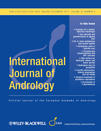Chromatin alterations induced by freeze-thawing influence the fertilizing ability of human sperm
Summary
A previous cytochemical study revealed that chromatin alterations could be induced in frozen-thawed human sperm. In order to evaluate the biological consequences of such chromatin alterations, we evaluated the relationship between these chromatin alterations and the drastic decrease or loss of sperm fertilizing ability after freeze-thawing. Using acridine orange staining and Feulgen-DNA quantitative microspectrophotometry, the nuclear variables of sperm were compared using samples which had either recovered, or lost their fertilizing ability after freezing -thawing during artificial inseminations, despite good post-thaw motility. There was a clear decrease in Feulgen-DNA content and nuclear surface values in sperm which exhibited a loss of fertilizing ability. Thus freeze-thawing may alter the DNA/nuclear protein relationships and impair the fertilizing ability of human sperm.




